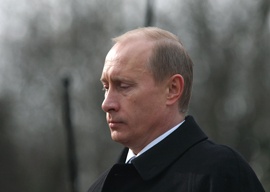
August 09, 2013

Vladimir Putin
Source: Shutterstock
“There have been times when they slip back into Cold War thinking,” said President Obama in his tutorial with Jay Leno.
And to show the Russians that such Cold War thinking is antiquated, Obama canceled his September summit with Vladimir Putin.
The reason: Putin’s grant of asylum to Edward Snowden, who showed up at the Moscow airport, his computers full of secrets that our National Security Agency has been thieving from every country on earth, including Russia.
Yet there are many KGB defectors in the United States, and Russia has never used this as an excuse to cancel a summit.
The Washington Post and Wall Street Journal are delighted, hopeful that cancellation presages a more confrontational policy toward Putin.
But is a second Cold War really a good idea? And if it is coming, who is more responsible for it?
From 1989 to 1991, Mikhail Gorbachev agreed to let Eastern Europe go free and withdraw his troops and tank armies back to the Urals. The Soviet Union was allowed to dissolve into 15 nations. In three years, the USSR gave up an empire, a third of its territory, and half its people.
And it extended to us a hand of friendship.
How did we respond? We pushed NATO right up to Russia’s borders, bringing in Poland, Czechoslovakia, Hungary, Rumania, Bulgaria, even former Soviet republics Lithuania, Latvia and Estonia.
European objections alone prevented us from handing out NATO war guarantees to Ukraine and Georgia. Was this a friendly act?
Would we have regarded post-Cold War Russian alliances with Cuba, Nicaragua, Venezuela, and Mexico as friendly acts?
To cut Moscow out of the Caspian Sea oil, we helped build a pipeline through two former Soviet republics, Azerbaijan and Georgia, and, thence, under the Black Sea to our NATO ally Turkey.
In the Boris Yeltsin decade, the 1990s, U.S. hustlers colluded with local oligarchs in looting Russia of her natural resources.
In the past decade, the National Endowment for Democracy and its Republican and Democratic subsidiaries helped dump over governments in Serbia, Ukraine and Georgia, and replace them with regimes friendlier to us and more distant from Moscow.
George W. Bush sought to put an anti-missile system in Poland and the Czech Republic. Neither country had requested it. We said it was aimed at Iran.
When my late friend, columnist Tony Blankley, visited Russia in the Bush II era, he was astounded at the hostility he encountered from Russians who felt we had responded to their offer of friendship at the end of the Cold War by taking advantage of them.